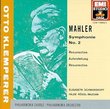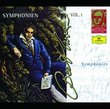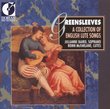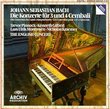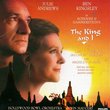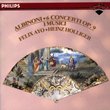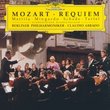| All Artists: George Frideric Handel, Nicholas McGegan, David Thomas, Philharmonia Baroque Orchestra Title: Arias for Montagnana Members Wishing: 0 Total Copies: 0 Label: Harmonia Mundi Fr. Release Date: 12/15/1995 Album Type: Import Genre: Classical Styles: Opera & Classical Vocal, Historical Periods, Baroque (c.1600-1750), Classical (c.1770-1830) Number of Discs: 1 SwapaCD Credits: 1 UPC: 093046701628 |
Search - George Frideric Handel, Nicholas McGegan, David Thomas :: Arias for Montagnana
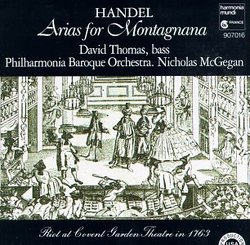 | George Frideric Handel, Nicholas McGegan, David Thomas Arias for Montagnana Genre: Classical
|
Larger Image |
CD DetailsSimilarly Requested CDs |
CD ReviewsGetting Excited About Baroque Opera Leslie Richford | Selsingen, Lower Saxony | 06/17/2006 (5 out of 5 stars) "George Frideric Handel (1685 ? 1759), Arias for Montagnana. Performed by David Thomas, bass, and the Philharmonia Baroque Orchestra, San Francisco, conducted by Nicholas McGegan. Recorded in September, 1989, at Lucas Studios, San Rafael, California.
Harmonia Mundi USA HMU 907015 (and also available on HMX 2907171.74). Total time: 67?40?. The story of Handel?s opera business in Georgian London is one of jealousy, intrigue, rivalry, factions and, occasionally, of singers coming to blows. No wonder, then, that the composer had, over the years, to replace singers who had left his troupe, often enough to join rival organizations. Italian bass Montagnana was with Handel from 1731 to 1733 and again, briefly, in 1737 ? 1738. As with his other ?stars?, Handel composed music specially for him, giving him roles which would best show off his abilities. These appear to have been considerable, with Handel not only writing new music but reviving arias from his Italian days with their incredible leaps and amazingly deep notes: ?Fra l?ombre e gli orrori?, although here sung in the Montagnana version from the opera ?Sosarme?, is better known as an aria of Polifemo from the cantata ?Aci, Galatea e Polifemo? (1707). This is not the only instance of self-borrowing on this disc. The Italian version of ?O ruddier than the cherry? from ?Acis and Galatea? (1732 version) ? presumably recomposed to avoid Montagnana having to sing in English with his heavy Italian accent ? is, in fact, based on music by Keiser, as Andrew Porter is at pains to point out. Opinions differ as to whether David Thomas is an ideal modern interpreter for these Da capo arias. Whereas Harmonia Mundi quote the late and highly respected Stanley Sadie of ?Gramophone? magazine with high praise (?Thomas has a formidable range, a dazzling technique [?] and a tone that is full and resonant yet always clearly defined?), others have been inclined to see Thomas?s timbre as problematical and to pour their praise instead (and with every justification) on the tremendous sound and playing of the Philharmonia Baroque Orchestra. I suppose this is, like so much in music, a matter of taste ? personally, I find David Thomas?s voice a little too throaty, in places almost sounding as though he could do with a throat lozenge and a week off work! Having said that, however, this is still a highly entertaining disc. Thomas had recorded some of the arias here a few years earlier (with the Academy of Ancient Music, conducted by Christopher Hogwood, in ?Esther? and ?Orlando?). Others are new, and, as in the case of the excerpts from ?Ezio?, ?Tolomeo? and ?Deborah?, rarely heard today. With the exception of a little obtrusive ?pre-echoing? at one or two points, the recorded sound is magnificent (compliments to engineer Peter McGrath), enabling one to hear perfectly every modulation of Thomas?s voice, but also those glorious strings, trumpets and other period instruments played so beautifully by the Philharmonia Baroque. This is truly music that can get me excited about baroque opera! " |

 Track Listings (17) - Disc #1
Track Listings (17) - Disc #1